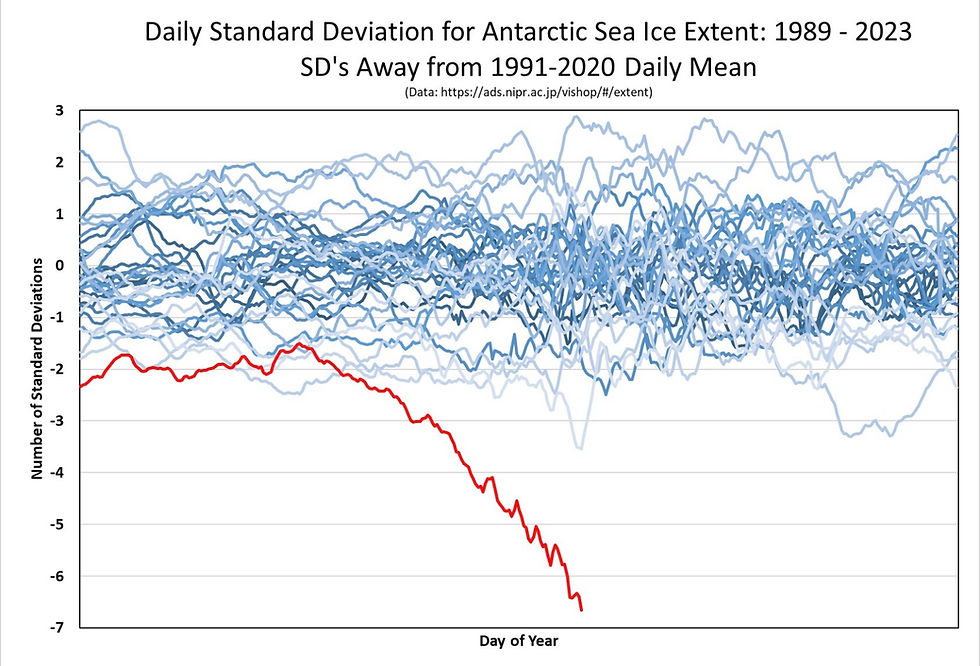Antarctica's melting ice sheets out of control
- Gregory Andrews

- Dec 1, 2023
- 2 min read
As #COP28 commences in the fossil-fuelled air-conditioned conference halls of the UAE, scientists across the world are sounding the alarm that Antarctica's melting ice sheets are out of control. The repercussions of this crisis will extend far beyond penguins and icy expanses of the Southern Ocean. They are already affecting global climate patterns and will have major impacts on sea levels during existing lifetimes. This latest science underscores an urgent need for the world to wake up from cognitive dissonance. We must address climate change and its impending consequences.
Oceans worldwide are undergoing accelerated warming, almost twice as fast as they were two decades ago. 2023 has already been marked as the hottest on record for global seas. Research by Professor Matthew England from the University of New South Wales emphasises that rising sea levels are a direct consequence of heat-induced water expansion and ice melting. The costs are already severe, with ecosystems and weather patterns facing unprecedented heat stress.
Approximately 90% of the excess heat generated by humans is absorbed by the oceans. Scientists have recently proven that the Southern Ocean around Antarctica is absorbing huge amounts of heat - nearly equivalent to the combined heat absorption of the Pacific, Atlantic, and Indian Oceans. Published in the journal Nature Communications, these findings underscore the critical importance of comprehending how and where oceans warm.
One of the most pressing consequences of ocean warming is the accelerated melting of Antarctic ice. British Antarctic Survey supercomputer simulations published in Nature Climate Change project unavoidable and significant melting of the West Antarctic Ice Sheet throughout this century. Even under the most optimistic emissions reductions scenarios, the ice sheet, responsible for a substantial contribution to rising sea levels, is losing 80 billion tonnes of ice annually. According to ice specialist Kaitlin Naughten, "It looks like we've lost control of melting of the West Antarctic Ice Sheet."And when the ice melts, more heat is absorbed rather than being reflected back out into space, thus creating a vicious cycle.
Despite the grim outlook, scientists emphasise the importance of recognising and responding to the situation in advance. With acknowledgment comes the opportunity to adapt to inevitable sea level rises. The lead time of approximately 50 years, though not a solution to the crisis, provides a window for coastal regions to plan and adapt.
And of course, the crisis is not confined to Antarctica. Satellite image analysis of Greenland, by the French National Centre for Scientific Research, reveals a loss of one-third of its ice shelf volume since 1978. This accelerates the looming threat of dramatic sea level rises.
My #ClimateHungerStrike might have seemed extreme to some. But in contrast, melting ice sheets at both poles are a signal of impending global catastrophe. They were one of the warnings from climate science that sparked my decision to undertake my hunger strike. The scientific community's analysis is a stark reminder that the time for action is now. And that the consequences of inaction are too grave to ignore.

To stay up to date, subscribe to my blog here.




Comments